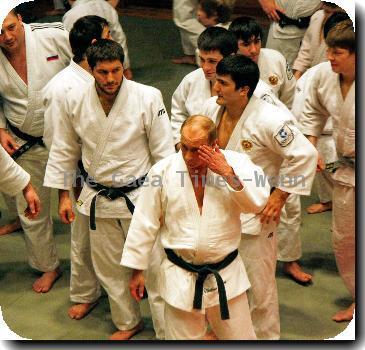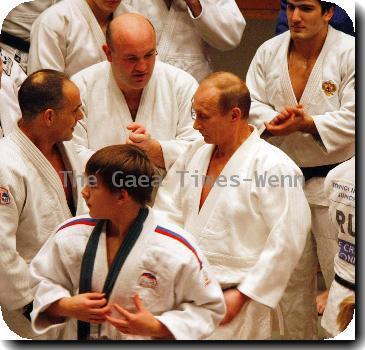Polish president’s body leaves Russia; Poles stand silent for 2 minutes of mourning
By APSunday, April 11, 2010
Polish president’s body leaves Russia
SMOLENSK, Russia — The remains of Polish President Lech Kaczynski have been sent home.
Russian Prime Minister Vladimir Putin and other top officials attended a solemn farewell ceremony at the Smolensk airport, where Kaczynski’s plane crashed Saturday while trying to land.
At the Field Cathedral of the Polish Army in Warsaw, hundreds gathered for a morning Mass and left flowers and written condolences. Among the dead were Poland’s army chief of staff, the navy chief commander, and heads of the air and land forces, who were all making the emotional trip to honor Polish officers slain by the Soviet secret police in 1940 in western Russia.
THIS IS A BREAKING NEWS UPDATE. Check back soon for further information. AP’s earlier story is below.
WARSAW, Poland (AP) — Thousands of people stood silent in the streets of Poland’s cities Sunday, in a silent memorial to President Lech Kaczynski and the other 95 people killed in a devastating plane crash.
The two minutes of silence were preceded by the thundering pealing of church bells and din of emergency sirens for nearly a minute before everything faded away. In front of the presidential palace, hundreds of people stopped what they were doing and stood, some with their eyes closed and heads bowed.
Earlier, at the Field Cathedral of the Polish Army in Warsaw, hundreds gathered for a morning Mass and left flowers and written condolences. Among the dead were Poland’s army chief of staff, the navy chief commander, and heads of the air and land forces, who were all making the emotional trip to honor Polish officers slain by the Soviet secret police in 1940 in and near the forest of Katyn in western Russia.
In Moscow, Russia’s transport ministry said that Russian and Polish investigators had begun to decipher flight data recorders of the aging Soviet-built Tu-154 airliner that crashed Saturday while trying to land in deep fog in Smolensk, killing all aboard.
Russian officials had initially said 97 people were killed but revised the figure to 96. Poland’s Foreign Ministry also confirmed the figure.
Polish government spokesman Pawel Gras said that despite the loss of so many leaders, the country’s armed forces were operating normally, and all state offices were doing the same.
That the crash occurred near Katyn served as a stark reminder to Poland of the horrors of that place. Kaczynski and those aboard the flight were headed there to remember the thousands of Poles systematically executed by Josef Stalin’s NKVD, the forerunner to the KGB, in 1940.
About 4,000 Polish army officers were killed in Katyn itself. In total some 22,000 officers and others were killed there and in other areas.
Polish-Russian relations had been improving recently after being poisoned for decades over the massacre.
Russia never has formally apologized for the murders but Russian Prime Minister Vladimir Putin’s decision to attend a memorial ceremony earlier this week in the forest was seen as a gesture of goodwill toward reconciliation. Kaczynski wasn’t invited to that event because Putin, as prime minister, had invited his Polish counterpart, Donald Tusk.
In Warsaw on Sunday, one mourner, Boguslaw Staron, said he turned out to honor Kaczynski, “a great patriot.”
“He taught Poles how to respect our traditions, how to fight for our dignity, and he made he made his sacrifice there at that tragic place,” said Staron, 70.
Kaczynski, 60, was the first serving Polish leader to die since exiled World War II-era leader Gen. Wladyslaw Sikorski in a mysterious plane crash off Gibraltar in 1943.
The bodies of Kaczynski and his wife were expected in Warsaw by early afternoon, the Foreign Ministry said. Kaczynski’s twin brother Jaroslaw flew to Smolensk on Saturday evening and identified the bodies.
People also continued to stream to the stately presidential palace in Warsaw’s historic center, where large sections of the street were blocked to traffic to allow the flow of people expressing their grief. Mourners carried candles and roses and joined a long line to sign a book of condolences in the palace.
Lech Walesa, the anti-communist dissident who went on to become Polish president, was among those who signed the book. A day earlier he called the crash the nation’s greatest misfortune since Katyn. “The elite of our country has perished,” Walesa said.
Children also placed simple drawings and messages of mourning: “I love our president,” said one, alongside a picture of a human figure and a cross.
Polish television carried black-and-white montages of those killed in the crash and devoted nonstop coverage to the crash, including lingering looks at Kaczynski and his wife, Maria Kaczynska.
Besides Kaczynski, aboard the plane were the national bank president, the deputy foreign minister, the army chaplain, the head of the National Security Office, the deputy parliament speaker, the Olympic Committee head, the civil rights commissioner and at least two presidential aides and three lawmakers.
Some on board were relatives of the officers slain in the Katyn massacre. Also among the victims was Anna Walentynowicz, whose firing in August 1980 from the Lenin Shipyards in Gdansk sparked a workers’ strike that spurred the eventual creation of the Solidarity freedom movement.
President Dmitry Medvedev declared Monday a day of mourning in Russia.
Polish and Russian investigators were examining the plane’s recorders, which will be key to the investigation because they contain crew conversations and flight data essential to determine the cause of the Tu-154’s crash.
The Tu-154 was the workhorse of Eastern Bloc civil aviation in the 1970s and 1980s. Poland has long discussed replacing the planes that carry the country’s leaders but said it lacked the funds.
According to the Aviation Safety Network, there have been 66 crashes involving Tu-154s in the past four decades, including six in the past five years. The Russian carrier Aeroflot recently withdrew its Tu-154 fleet from service, largely because the planes do not meet international noise restrictions and use too much fuel.
The Polish presidential plane was fully overhauled in December, the general director of the Aviakor aviation maintenance plant in Samara, Russia, told Rossiya-24. The plant repaired the plane’s three engines, retrofitted electronic and navigation equipment and updated the interior, Alexei Gusev said. He said there could be no doubts that the plane was flightworthy.
News of the crash left Poland reeling, grasping for answers.
“I was traveling on a plane last night and everyone was discussing the crash — why it happened and what comes next for Poland,” said Hanna Wojcik, 70, in Warsaw. “And everybody was saying that it is some tragic fate for the nation that it loses its most valuable sons near Katyn.”
Isachenkov reported from Moscow. Associated Press Writers Vanessa Gera and Matt Moore in Warsaw contributed to this report.
Tags: Accidents, Eastern Europe, Europe, Moscow, Poland, Russia, Smolensk, Transportation, Vladimir Putin

